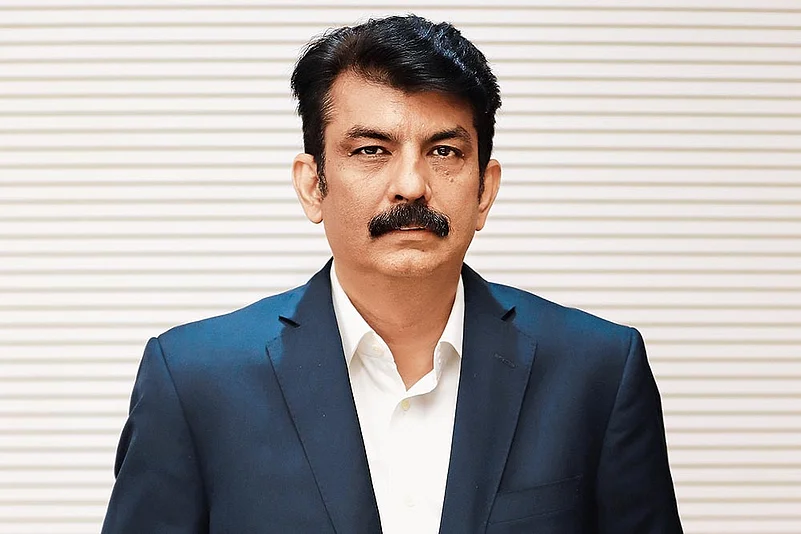What runs through the mind of a chief executive officer when his company’s revenue drops by over 95% in a matter of days? “I guess, I have not experienced a worse disaster in my work life so far,” says Rajesh Magow, the co-founder and group CEO of MakeMyTrip (MMT), who had found himself in that situation last year. Between April and June 2020, MMT, one of the world’s largest travel booking apps, saw its total revenue drop 95.5%—from $141.7 million in the same period a year ago to $6.36 million.

MMT, a clutch of three companies—MakeMyTrip, Goibibo and RedBus—has had a two-decade-long history of struggles and successes. It not only survived 9/11 and the SARS pandemic but also became India’s first internet start-up to get listed on Nasdaq. “But, none of them were so intense… Also, because we were very small at that time, we had learning from the past of dealing with a pandemic-like situation,” says Magow.
It was frustrating. “The added frustration was because we were cruising along really well. We were feeling very happy that we’d turned the corner and had become profitable,” Magow says. “And then, it (Covid-19) happened.”
With a market capitalisation of nearly $3 billion, the company witnessed a massive erosion of valuation. Its share price dropped from $28.56 per share on February 20, 2020 to $12.83 by March 30, 2020.
For Magow, it was stressful and he had to act fast. He realised that he could bring the focus back on the business by staying calm. “If you end up not acting or if you end up panicking, frankly, it doesn’t take you anywhere… You have to deal with it quickly, gather yourself and say what is that shift that you need to do,” he says.
While on the one hand, he had to get the focus within MMT, cut costs, and sustain the business, on the other, as a market leader, he had to bring the industry together. “After the first couple of months, the focus shifted to—‘How do we now bring the industry together and leverage ecosystem support?’,” says Magow. He did both.
In May 2020, MMT brought together 30 other companies across airlines, hospitality and other ancillary industries to take a safety pledge to commit to safe travel and win back the travellers’ confidence. In August 2021, it signed a Memorandum of Understanding (MoU) with the Ministry of Tourism to promote hotels and homestays that had self-certified SAATHI (System for Assessment, Awareness & Training for Hospitality Industry) badges. MMT also partnered with the Ministry of Civil Aviation to promote regional air connectivity.
Then comes managing operations at almost negligible revenue run rate. “The job was P&L management… Luckily for us—and that is from our past learning—we always maintained enough cash on our balance sheet. Relatively speaking, it was not an existential crisis for us,” adds Magow.
But, at the same time, the MMT management did not know how long the lockdown would last. “It was pretty uncertain. It was a completely unprecedented situation. Nobody really knew about this whole mess. So, from that point of view, we were thinking, ‘How much cash would you need if this continues for two years?’,” he recalls.
“We started doing our planning accordingly. What we needed to do was to plan our cash flows in a way that we have a runway for at least three years, even if we don’t end up raising capital anymore,” says Magow, for whom the main aim was to sustain the business for at least three years if the pandemic continued. He also looked at other scenarios like what if a portion of travel opens up.
“We looked at our fixed costs and we looked at our variable costs,” says Magow. Luckily, for MMT, the variable cost was really high—mostly on the sales and marketing side—which could be cut down quickly. Then Magow started cutting down fixed costs—whether it was IT hosting cost, operations cost, Amazon Web Services cost or even facilities. “One by one, our CFO ended up doing heavy lifting with each team. Also, I think given the standing of the company, the relationship over the years, and the amount of business our partners have done with us, they were forthcoming in either giving moratorium or negotiating or cutting back or readjusting the cost. Similarly, with our banking partners, technology and service providers, and so on, we attacked all the costs and made the fixed costs as minimal as possible,” he adds.
However, Magow was hoping he didn’t have to touch the people cost. So, the philosophy was to start some salary cuts from the top or those who participated voluntarily. But there were some rightsizing, too. “We had to right size about 10% of the workforce which was painful,” he says.
As soon as the situation was under control, Magow decided to raise more capital. “We actually got $30 million in converts, convertible bonds and long-term loans at no interest cost. We ended up $450 million-plus cash on our balance sheet,” he adds.

The pandemic also brought in a new normal for the travel business, all of which are new business opportunities for the company. For example, because of the uncertainties, people are going to look for more flexibility. That has led to a higher purchase of products like “zero cancellation”. “We have been working with our hotel partners to go back to their really old, never-touched cancellation policies, do some out-of-the-box thinking and come up with some smart, creative reconciliation for the policies which are user friendly,” says Magow.

MMT has also seen business flowing from emerging categories such as alternative stays, especially preferred by youngsters. “Whether it is with friends or family, people are exploring more destinations and kinds of accommodation. They’re not necessarily even looking at the comfort of the hotel but all kinds of alternative accommodations like villas, apartments or even hostels,” says Magow. He adds that earlier, alternative accommodation contributed almost nothing to MMT’s revenue. Today, it is about 10% and in the future, it has the potential to become 25%.
As preferences continue to evolve and as experience becomes important, personalisation will matter for higher revenue outcomes. To begin with, MMT is trying to reduce the number of steps a person takes to reach from discovery to the final booking or checkout page. “If we have a history of you buying a particular hotel on a particular location of a certain price category, your search and the ranking order should start with those categories of hotels or, at the bare minimum, it should prompt you the hotel that you would like to book,” he says. By doing so, Magow says, MMT can give a faster booking experience.
So, what can MMT potentially do five years down the line? “We would want pretty much every customer to get delighted. So, if I have to start thinking about travel again, MMT should be the first name that should come to my mind. That’s really what we want to achieve from a long-term standpoint,” says Magow.
Will it be a Netflix-like personalisation for a travel booking platform? “There is a user history and we have a Customer Lifecycle Management programme where we say, ‘You haven’t really traveled for the last six months and here are the options for booking, here are the offers for you’, among other things,” Magow says.
“But I think that some of the segments might end up being a little bit of a premium in the form of stickiness,” he says, talking about how users might come again and again. “If we have to be futuristic, we have to think about how to retain the customer,” says Magow, who believes that it is only the experiences that can really increase retention.
“I think what we need to improve upon even more is one-on-one personalisation and make MMT more and more relevant for the customer,” says Magow. Perhaps it would be safe to assume that MMT will stitch all individual interactions together and even suggest the next destination that you should visit. But honestly, that is a little far away.
Sunny Sen is the co-founder and CEO of ConsCent, a payments and analytics company building the future of content monetisation. Before ConsCent, he was a business journalist with Network18, The Economic Times, Hindustan Times, among others.






























